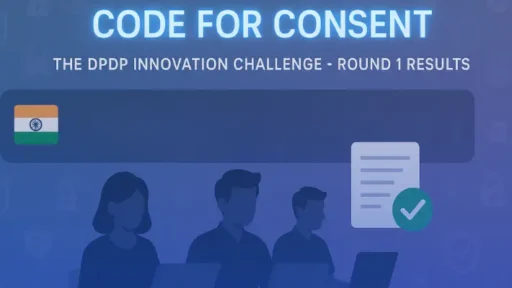India’s Digital Personal Data Protection Act (DPDPA), 2023 is a revolutionary law that changes the way organizations deal with personal data. One of its core principles is the classification of bodies as Data Fiduciaries or Data Processors, which has a big impact on the accountability, responsibility, and legal obligations relating to the handling of that personal data.
In this blog, we will provide an overview of the main characteristics of both roles, their responsibilities and their implications for businesses, legal professionals, and individuals. We will also include an easy-to-read comparison table to distinguish between the two.
What Is a Data Fiduciary?
A Data Fiduciary is any person, business, or entity that determines the purpose and means of processing their personal data. In other words, the data fiduciary is the decision-maker. The data fiduciary decides the “why” personal data is being collected and the “how” it will be used.
Examples of Data Fiduciaries:
- An e-commerce platform collecting customer data
- A bank that manages the accounts of its customers
- A healthcare provider storing patient records
Because fiduciaries control the “why” and “how” of data usage, they bear the primary compliance burden under the DPDPA.
What Is a Data Processor?
A Data Processor is a person or organization that processes personal data for a Data Fiduciary the fiduciary provides the data processor instructive direction and does not control the purpose of any processing of data.
Examples of Data Processors include :
- Cloud providers for storage.
- Call centers providing customer support.
- IT vendors who manage databases.
In essence, processors are vendor providers. They do not work independently and there is a fiduciary relationship with respect to the processing of data, but processors play a very important role in data responsibility.
Key Responsibilities of a Data Fiduciary
Data Fiduciaries serve as the cornerstone of the Digital Personal Data Protection Act (DPDPA). They are entrusted with the responsibility of ensuring that the collection, processing, and management of personal data strictly adhere to lawful purposes and uphold the privacy rights of individuals. While the specific obligations of a Data Fiduciary may differ based on the nature, size, and sensitivity of the data they handle, the Act outlines a set of core duties that all fiduciaries must comply with. These include:
- Transparency: Be upfront with individuals as to what data an organization collects, why you are collecting it, and how it will be used.
- Consent Management: Get valid consent from individuals, and manage that consent offering easy paths to withdraw consent.
- Purpose Limitation: Information collected on the data subject is only for the specific lawful purpose disclosed to the subject upon the collection of that data.
- Data Minimization: Collect the data that you need, nothing more!
- Data Accuracy: Make sure that the personal data held on behalf of the data subject is accurate and updated.
- Security Measures: Strategies to protect data like encryption, and access control to prevent a data breach, guarantee you apply appropriate safeguards!
- Breach Notification: Must notify the board along with the definitions of affected individuals, in the case of a data breach, including a significant data breach.
- Data Principal Rights: Must facilitate the ability for the data subject to access, correct, or delete personal data, upon request.
For larger organizations described as Significant Data Fiduciaries there are additional obligations including having a documented Data Protection Officer, doing yearly audits, and providing Data Protection Impact Assessments.
Key Responsibilities of a Data Processor
Data Processors have no direct statutory duties under the DPDPA, as opposed to Data Fiduciaries, who do. However, Data Processors have contractual obligations towards Data Fiduciaries.
Key points about Data Processors:
- They must process personal data in accordance with the fiduciary’s instructions.
- They should put in place appropriate security safeguards to protect the data.
- They must delete or return personal data when requested by the fiduciary.
- They must assist the fiduciary in respect of breach investigations and data subject requests.
Although the law does not penalize processors directly, fiduciaries can hold them contractually liable for any lapses. Therefore, processors must be prepared to comply fully with all agreed terms.
Comparison Table: Data Fiduciary vs Data Processor
Here’s a quick overview of the key differences between the two roles under the DPDPA:
| Aspect | Data Fiduciary | Data Processor |
|---|---|---|
| Role | Determines the purpose and means of processing data | Processes data on behalf of a fiduciary |
| Decision-making power | Yes – decides why and how data is processed | No – only follows instructions |
| Legal Obligations | Full compliance with DPDPA: notices, consent, accuracy, security, breach response | No direct legal duties; follows fiduciary contract |
| Contracts | Must engage processors through valid contracts | Can operate only under contract with fiduciary |
| Accountability | Fully accountable for all data processing and compliance | Accountable through contract, not law |
| Examples | Banks, hospitals, edtech companies, e-commerce firms | Cloud service providers, analytics vendors, BPOs |
Best Practices for Businesses Under DPDPA
Whether as a Data Fiduciary or a Data Processor, these best practices will allow you to remain compliant with the DPDPA:
For Data Fiduciaries:
- Audit all data flows and map all the locations where personal data is stored or transferred.
- Draft strong agreements with processors that cover data handling, information security, breach, and liability.
- Use a consent management platform to provide easy tracking of fragments of individual consents and updates. ( Concur is one of the best option for the consent management platform)
- Train your staff about their data privacy responsibilities and customer rights.
- Plan for breach scenarios with an incident response strategy.
For Data Processors:
- Know your contractual terms well, and comply with them strictly.
- Enhance data security protections including, without limitation: encryption, access limitations and other safeguards.
- Assist fiduciaries in their duty to facilitate individual data rights, and in reporting breaches.
- Be transparent with fiduciaries with respect to any subcontractors or other sub-processors you might use.
Why Understanding This Distinction Matters
Many businesses fulfill both roles, as a fiduciary for customers and a processor for other companies. For example, a fintech startup could collect user data directly to provide services (Data Fiduciary), while it provides backend services (that includes customer data) to another organization (Data Processor). In hybrid roles like this, the line between a fiduciary and a processor might not be clear if roles are not clearly stated.
There are serious consequences of misunderstanding these roles leading to non-compliance, legal liability, and financial penalties. Specifically, if a business tries to be a processor but–in practice–makes the decision of how the data is managed, it is likely to be unintentionally acting in the fiduciary role–with no actual fiduciary responsibilities, legal safeguards or governance in place. This may put the organization in regulatory action risks as well as damage user trust and their corporate brand.
Embrace Data Responsibility with Confidence
The DPDPA marks a pivotal shift in India’s digital ecosystem. It grants individuals strong data rights and holds organizations accountable for handling that data responsibly. As a Data Fiduciary, you are not only accountable—you’re expected to proactively uphold privacy principles and lead with responsibility. As a Data Processor, even though you operate based on contractual obligations, your actions directly affect user privacy and carry equal importance.
Understanding your obligations and duties of Data Fiduciaries and Data Processors—and carrying them out in good faith—is the first step you can take to build digital trust and legal compliance in the new data protection framework of India.
Simplify Compliance with Concur Consent Manager
Want DPDPA readiness made easy? Concur Consent Manager has helped businesses like yours track compliance, manage user consent, and deal with data principal requests – all on one platform!
Stay ready for audits, help lower legal risk, and build trust with your users – the smart way.
Check out Concur Consent Manager and get started towards easy data compliance today!








